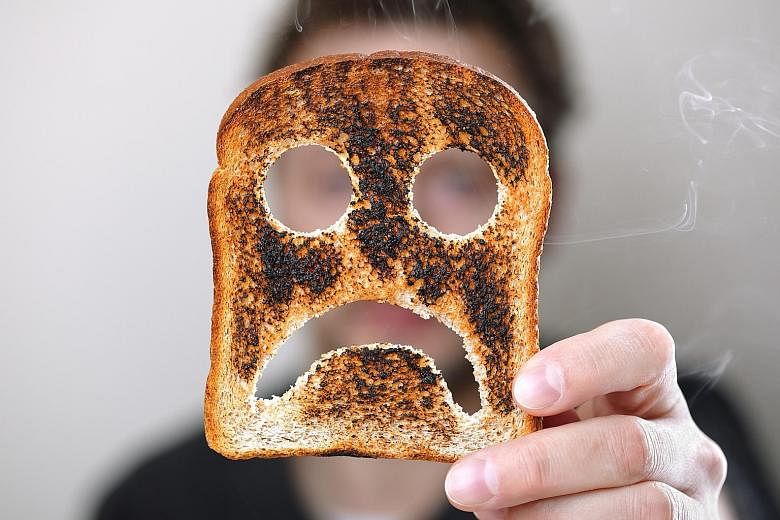Overcooked starchy foods can contain acrylamide, a chemical linked to cancer, the Food Standards Agency in Britain warned last month.
It launched a public health campaign, dubbed Go For Gold, urging people to turn off the heat once toast, potatoes or other starchy foods are lightly browned.
It also advised people to reduce their intake of overcooked foods.
Is this just another health scare?
The link between charred foods and health troubles can be traced back to an incident in 1997. Back then, farmers in south-western Sweden had found cows paralysed or dead in their fields.
Lifeless fish were spotted floating in a river and workers at a construction site began suffering from nausea and prickling sensations in their fingers. Suspicion fell on a major construction project to drill a railway tunnel through the ridge.
Tests confirmed that a sealant had leaked high levels of a toxic chemical intothe water. The chemical was acrylamide.
What began as an environmental scandal soon morphed into a public health scare.
Professor Margareta Tornqvist, an environmental chemist at Stockholm University, carried out tests on the construction workers, which revealed high levels of acrylamide in their bloodstream.
Unexpectedly, significant levels of the chemical were also present in a control group.
"We realised that if this background signal really was acrylamide, it meant that ordinary people are always exposed to acrylamide," said Prof Tornqvist.
Since the compound is not found in wild animals, processed food was identified as the likely culprit.
Prof Tornqvist and her team had discovered that acrylamide is found in high concentrations in starchy food, like bread and potatoes, when it is cooked at high temperatures.
In 2000, the team published a study involving rats being fed fried food that concluded that acrylamide consumption "is associated with a considerable cancer risk".
The resultant public health advice became embroiled in controversy. And, nearly a decade on, there is a lingering question over whether we should be worried about acrylamide in our diet.
DON'T BURN YOUR TOAST?
Last month, the UK Food Standard Agency became the latest regulator to draw consumers' attention to the issue with its Go For Gold campaign that urges the public to avoid singeing their toast or leaving roast potatoes to char in the oven.
"Aim for a golden yellow colour or lighter when frying, baking, toasting or roasting starchy foods like potatoes, root vegetables and bread," the agency advised.
But it also acknowledged that "there is more to know about the true extent of the acrylamide risk".
Critics pointed out that animal studies linking acrylamide to cancer have used doses so far above the average daily consumption in humans that extrapolating the results is questionable.
A person would need to eat 75kg of chips every day for two years, for instance, to be getting the cumulative dose of acrylamide (200mg/kg daily) used in one rat study that showed the compound could cause DNA damage when it latched on to haemoglobin in the blood.
Prof Tornqvist said that some chemicals have a minimum threshold concentration below which they are not dangerous, but this is not the case for DNA-damaging chemicals known as carcinogens.
"With chemicals that damage DNA, it's a linear dose response, so even the smallest dose contributes to the risk," she added.
The American Cancer Society describes acrylamide as a "probable carcinogen" in a list that includes hot beverages, working as a hairdresser and insecticides.
Indeed, many items do not lend themselves to practical measures to reduce exposure. With acrylamide, agencies can point to the simple step of not burning your toast.
Attempting to establish the link between a ubiquitous chemical and an incremental cancer risk is a daunting challenge.
A recent meta-analysis found no evidence of a risk for cancers of the oesophagus, stomach, pancreas, breast, lung and prostate.
Sir David Spiegelhalter, a professor for the public understanding of risk at the University of Cambridge, said: "Nobody can put any numbers on acrylamide, but it can't be that bad. We'd know about it if it was."
Even if the risk is small, Prof Tornqvist said it is worth acting on.
"Why should (food agencies) bother about a lot of other things with much smaller risk if they don't bother about acrylamide?" she said. "Shouldn't we try to protect people from that the best we can?"
It seems that the food industry has taken the message on board.
Between 2007 and 2015, there was a 30 per cent reduction in acrylamide across all products in the UK, according to figures from the Food Standard Agency.
However, Prof Spiegelhalter argues that, while there may be a good case for issuing industry guidelines, there must be a higher bar for issuing public health warnings.
The outcome of vague fearmongering, he said, is not a society that examines its diet with rigour. Instead, other more pressing health messages are simply diluted.
"I don't believe exercises like this increase people's trust in science. It just gives them an excuse to ignore what they don't want to hear."
THE GUARDIAN

